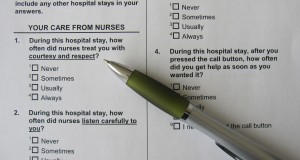You understand the limitations of the HCAHPS survey if you work in a hospital today. Whether a busy clinician or clinical leader, you will appreciate having access to a new study about the limitation of quantitative measures alone in analysis of patients’ experience with their hospital care.
 Two take-a-ways from this study
Two take-a-ways from this study
- Patient comments enhanced the numerical results of the survey
- Patients who provided negative comments gave significantly lower numerical scores
The Journal of Healthcare Management recent article gives credibility to the importance of qualitative feedback from patients. 20% of the 589 patients, who responded to the HCAHPS, found ways to write comments on the survey form. Of course, these comments are not included in the report hospitals see, and public feedback at this point is fraught with unknowns. But they can be a treasure trove for hospital staffs striving to understand the value of the survey scores.
Why Comments Matter!
One example from this study is from question #2. The survey points to what we can learn if patients are provided with ways to tell us their story. The question is, “Did your nurse listen to you?” This patient marked the question twice then wrote “day nurse never”, “night nurse always”. But, as you may have guessed, this question was eliminated when the survey was tallied by CMS because the patient marked it twice.
If busy teams and administrators lose important feedback, as this example shows, how on earth is good change going to occur? Let’s explore the first comment where the day nurse never listened.
It might be that the day nurse was coordinating care for 8 or 9 patients, organizing several patients off to surgery, managing their return several hours later, discharging another two or three folks, and admitting just as many patients in 12 hours. Did this nurse have a care assistant or clerical support? How many medications were administered, monitored and altered based on patient response? How much time was required to document in the EHR?
This question opens the door to a larger system issue. If we are going to communicate with our patients, and if we value the clinician-patient relationship what can we do to make listening a value in the organization?
Patient Engagement through Negative Feedback
When patient comments written on the HCAHPS are discounted we lose essential qualitative data as a result. Some organizations are seeking qualitative feedback from their patients independently. This is helping them focus more clearly on the quality of the patient’s experience. And as the study suggests, the people who write negative comments score the quantitative items very negatively as well. Analysis here can open many avenues for change.
Inviting patients to tell us the good and the bad about their care may become an essential survival tool for hospitals. If your organization is collecting internal data on the patient experience, are you providing the findings to staff quickly?
When feedback comes months after an event it has very limited value. Cochrane Systematic Review of Audit and Feedback for clinicians shows variations across the 140 studies however key points include the need to present the data both verbally and in some visual/written form. Timeliness is essential if feedback is to have value. So if your clinical team is seeking ways to interpret patient feedback, make it timely.
Death by Data
If you are grounded in evidence-based thinking then you know we cannot change what we do not measure. Setting realistic targets for outcomes and very realistic measures…limited in number…gives us a roadmap for our progress. But clinical teams are starting to drown in measurement. And my personal bias is that we are on the brink of losing the heart of care. So many measures and their relevance to caring for human beings is slipping into a sea of almost meaningless numbers.
How can a busy team salvage meaning from this?
- Make the measures relevant to the care setting.
- Limit the number of measures to the most essential criteria
- Provide feedback in easy to understand graphic
- Provide that feedback quickly, sooner the better
- Show the team progress
- Move on to the next challenge
Leave a Reply